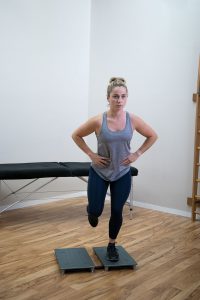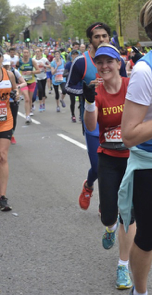Physio Biomechanical Assessment For Runners
Thinking of taking up running? You should consider a physiotherapy biomechanical assessment first.
In recent years there has been a global surge in people taking up running for the first time. In the UK the running app ‘couch to 5K’ saw a 92% increase in downloads in 2020 compared to 2019. However, many of these people who start running soon have to stop due to an injury.

Does this mean that running is therefore bad for you? No, not at all!
Each of our physios at Kinetic Physio have over 15 years experience of treating all kinds of running related injuries. However, wouldn’t it be nice if we could help to prevent these injuries in the first place?
One of the clues to achieving this is in our clinic name. The ‘Kinetic’ link principle describes how the human body can be considered in terms of a series of interrelated links or segments. Movement of one part of the body (segment) affects other areas of the body both above and below the first area of the body.
Running injuries are often caused by poor body alignment and/or physical and muscular imbalances of the body. Put simply, running injuries are not often as a result of one localised ‘weak area’ in the body. Some people are tight and inflexible, others have too much flexibility, others may lack stability in certain areas, some people are weak in many areas, whilst some people may be all of the above! When a new hobby is introduced, such as running, the body is not used to these new additional loads on their tissues and this can result in an injury and pain. Sometimes the injury and pain can be felt immediately but in other people it can manifest itself at a later date as the individual’s training progresses.
A full body biomechanical assessment BEFORE starting to take up running can help to highlight any parts of the ‘Kinetic’ chain that need to be worked on to prevent injuries.
What does a biomechanical assessment look like?
1. Initial assessment
· We will listen to your history eg any previous injuries, general health etc
· Understand your running goals
· Observe your body position, alignment and the ways you move
· Measure your flexibility and joint range of movement throughout your body
· Measure the strength of specific muscles (we have access to hand held dynamometers and force plates which are used by high performance teams around the world)
 ·
·

- Assess your general ‘functional’ strength and stability
- Assess your running style
2. Advice and Exercises
· Using the information that we gather in your assessment we will provide you with a series of home exercises that are specific to you. This may involve specific stretches and strengthening exercises with the aim being to minimise the risk of an injury.
· If appropriate we can provide hands on physio treatment
· We will provide advice on other aspects of running too eg advice on appropriate footwear and the importance of sleep and relaxation to aid your running
3. Review and re-assess at a later date (if the patient wishes this)
· Re-assess and monitor progress
· Adjust and progress home exercise programme as appropriate.
· Provide advice on when and how to begin and progress your running
4. BEGIN running and MINIMISE risk of future injuries!
· It is important to keep your exercises varied and progressive so that you are in a better position to tolerate increasing your running distance, increasing your running speed, or adding in hill training.
Be wise, be sensible, and prevent running injuries…. Book in for a physiotherapy assessment at Kinetic Physio today!

Our specialist physiotherapist, Evonne, injury free and enjoying running in the London Marathon!










